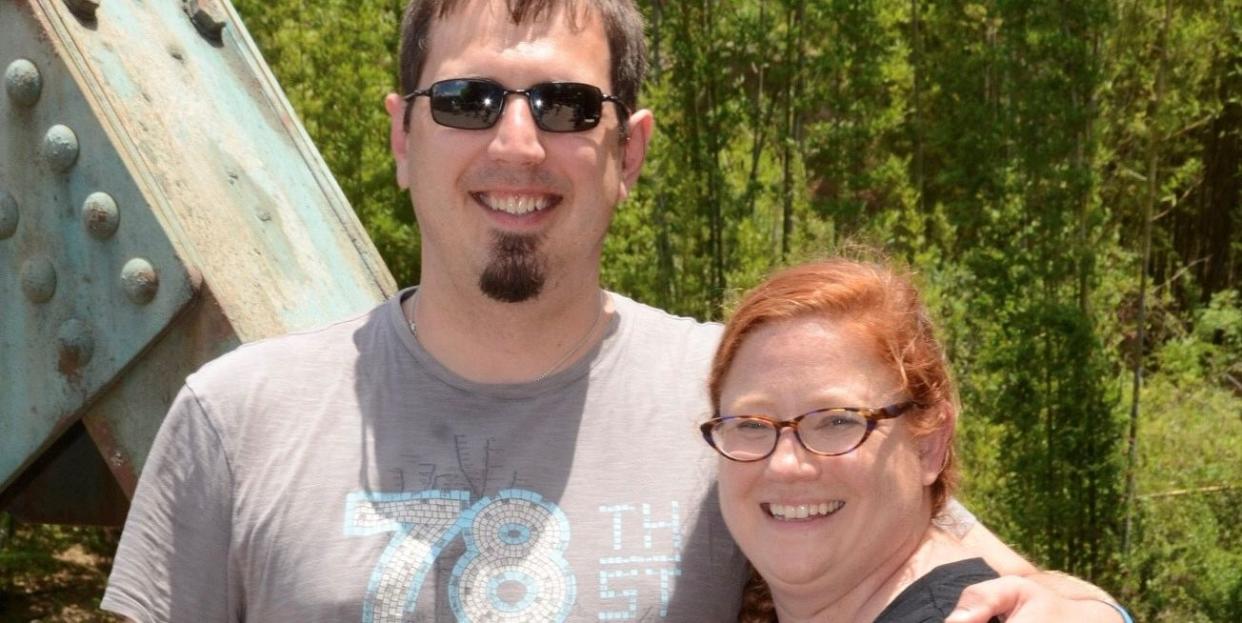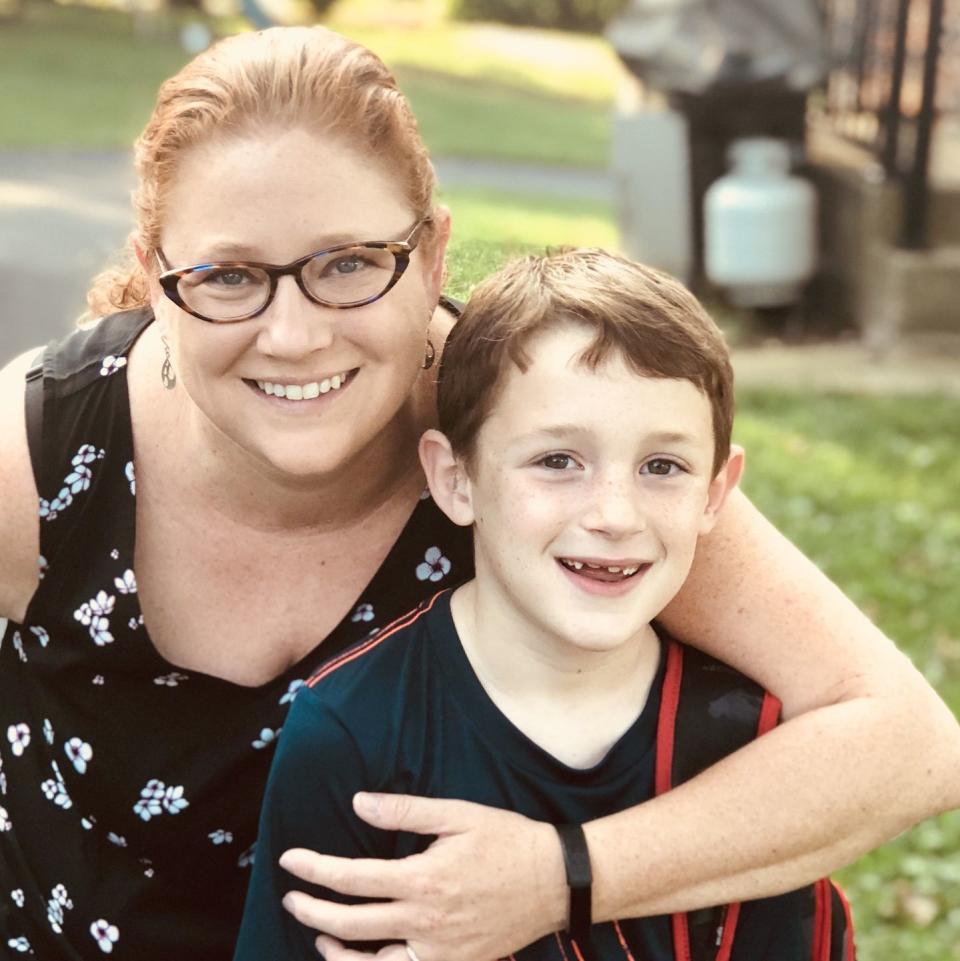Doctors Misdiagnosed Me with Pneumonia, But My Nagging Cough Turned Out to Be Lung Cancer

It all started in October 2015. I was 35 at the time and got what I assumed to be a normal fall cold—I have a habit of getting sick in October. Then I developed a cough that I couldn’t get rid of, so I went to the doctor and was prescribed antibiotics. I thought everything was going to be fine, but it wasn't.
I struggled with the cough for a good month to month and a half, and doctors kept treating me like I had pneumonia. I went through three rounds of antibiotics before they actually said, Hmm, maybe we should take a look. The doctors assumed I had some kind of weird bug, but since all the antibiotics they gave me were what they normally would use to treat pneumonia and it wasn't clearing up, they did an X ray. And, of course, they saw something.
At that point, I received a CT scan, but even then, nobody seemed panicked. They said there was some consolidation in my lungs and referred me to a pulmonologist, who classified what I had as BOOP (a rare form of pneumonia that affects the small airways, air sacs, and walls of small bronchi in the lungs). She wanted to send me home with steroids and have me come back in a month, but I balked—I had a debilitating cough that made everything hurt—so she finally told me to give her a call if there was no improvement in two weeks.
Sure enough, there was no improvement. That's when they decided to do a bronchoscopy, a procedure in which a tube with a small camera attached is inserted through your nose or mouth and down to the bronchi and bronchioles in your lungs to try to spot things like tumors, an infection, bleeding, or blockages. In my case, that’s when things hit the fan and they told me I had lung cancer.
Getting the right treatment
By then it was January 2016, so the whole process, from the initial coughing to diagnosis, took about three months. There was so much back and forth and rigmarole, but had I not stuck with it, it probably would have just continued to fester. Fortunately, they sent me for a PET scan and confirmed that the cancer had not spread anywhere outside of my lungs. We caught it early, which I'm hoping turns out to be a good thing. About a month later, they confirmed that my particular cancer had the ALK mutation. The nice thing about that is, thanks to research, some decent drugs have been developed. So, since February 2016, I've been taking pills, which have kept everything in control so far. The goals of the drugs are a combination of shrinking it, stopping it, containing it, and keeping the cancer from spreading. I think I was on the initial drug for about a week and felt like a whole new person. I stopped coughing right away, a miracle.
The only problem with the drugs is your body builds a resistance to them and they stop working after about a year so I'm now on my third drug. I’ll stay on the drugs indefinitely until we run out of options or some miracle treatment is discovered. I will never be cured. I will never be in remission. I’m now 39 living with a disease that has a very poor five-year outlook, which is not exactly a fun situation. Thankfully, my drugs have very few side effects so I am able to live a “normal” life. At this point, you would never know walking down the street that I'm dealing with anything like this. I don't have the typical chemo look with a headband yet, but it’s still tough.
I've got a pretty close family nearby, so in the beginning, when I was first diagnosed and before I started taking the meds, my mom and sister and others who are really close to me were right there helping me with everything I needed. Now it’s sort of old news so I don’t think it’s on everybody’s radar as much. I'm doing well so other than when it comes time for the dreaded three-month scan or an upcoming oncologist appointment, it's pretty much a normal everyday life, but I know when the time comes that I need something, they're there.

Breaking the news to my son
What really keeps me going each day is my 8-year-old son. We waited a while to tell him because we thought he was too young. In the very beginning, he knew I was coughing all the time so we told him Mommy was getting medicine for the cough or going to the doctor because Mommy has a cough. And then Mommy's cough just kind of went away because she went to the doctor, she spent a couple days in the hospital, she did what she had to do, and now she's taking medicine and her cough is good. Last year, we finally sat him down and asked him if he remembered the cough and then said it was because Mommy has lung cancer. We filled him in on the basics, he cried, then kind of took a minute and said, “I don't want mommy to die.” We told him we don't either and since then we’ve been keeping an eye on him and haven't noticed any red flags yet. But again, it's not really affecting our daily lives, which makes it easier for me to not dwell on it and just keep pushing forward because I don't want him to see me upset. But that was a tough conversation.
There is a lot in his future that I really hope I'm here to share with him. That's the one thing that really gets to me about all of this, just knowing that, statistically, my days are drastically numbered. It’s really scary to think that I won't see my son graduate high school. It’s just another reminder that anybody can deal with this and there really needs to be more research and funding.
The fight for funding
One difficult thing is that we just got through October, which is pink everything. There’s all this love for breast cancer and here we are in November (Lung Cancer Awareness Month) and we just move on. I am fighting something that still has a stigma. Everybody still looks at lung cancer as a smoker’s disease, but I never smoked. I haven't touched cigarettes a day in my life.
Lung cancer is actually the number one killer when it comes to cancers. It takes more lives each year than the next three combined (colon, pancreatic, and breast), but it doesn’t get a proportional amount of funding for research. And it's not just smokers that get it. If you have lungs, you can get lung cancer. It can be your mother, your father, your sister, your brother, and your daughter. I mean, there are some people that are battling this younger than I am. The perception needs to change. All of this can be upsetting to think about, but I try not to dwell on it because life is definitely short and I want to enjoy everything I can while I can.
Reaching out to others
If I could talk to someone else who has just been diagnosed with lung cancer, I’d tell them to make sure that they've had the proper genetic testing to determine if there's any sort of genetic component to their lung cancer. For instance, there's my ALK mutation and then there's an EGFR as well as some others. Each variation has a different form of treatment available that is effective, so the genetic sequencing needs to be done to make sure that a person is treated the proper way. You want to make sure you know what you're dealing with before you jump straight into chemo or radiation.
Beyond that, it's just about not losing hope and finding the right community that gets it. There are a lot of lung cancer groups out there. I don't have very many local people, but I have a great online community with people there to answer my questions and listen to me vent. You need that.
Other folks who are interested in getting involved can start by reaching out to some of the bigger organizations such as the American Lung Association and their initiative Lung Force to find out what's going on in the area. There aren’t a ton of lung-focused events, but there are some here and there, and of course, the organizations also take donations.
Like what you just read? You’ll love our magazine! Go here to subscribe. Don’t miss a thing by downloading Apple News here and liking Prevention. Oh, and we’re on Instagram too.
You Might Also Like

